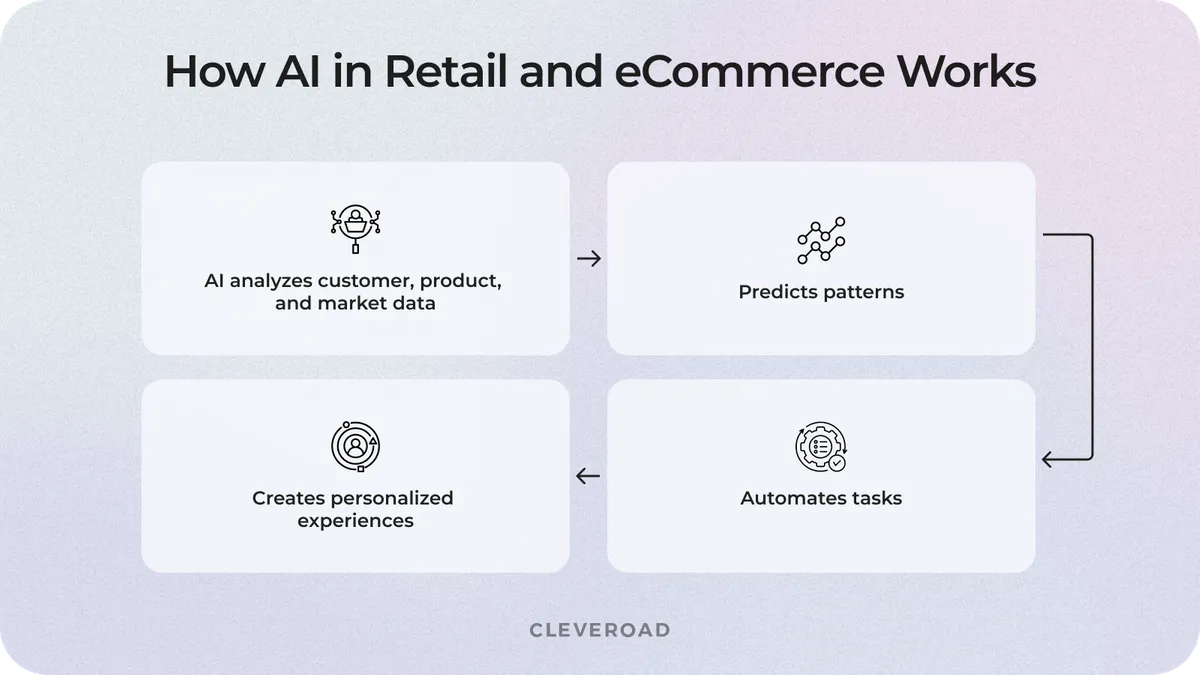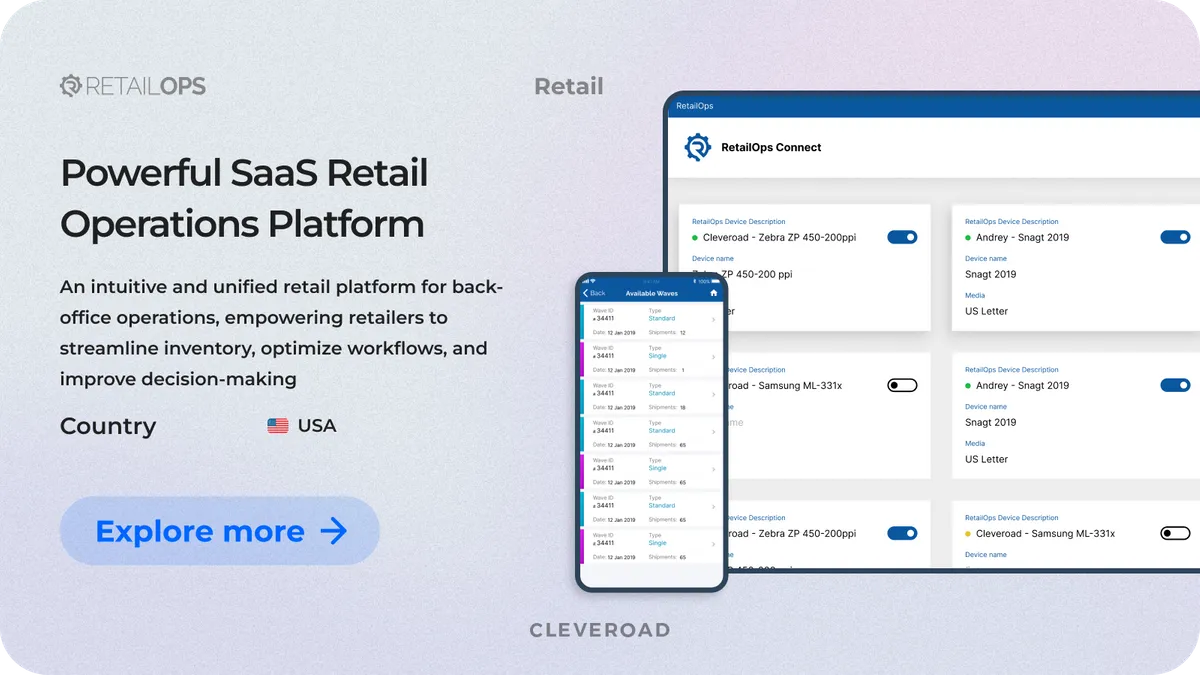AI in Retail and eCommerce: Benefits, Application Strategy, and Future Trends
14 Oct 2025
15 Min
121 Views
How can AI in retail and eCommerce impact your business? AI may considerably change the way you interact with customers and operate behind the scenes. This is a great opportunity to adopt automation and cut on time and money needed to provide a high-quality shopping experience.
At Cleveroad, we have over 13 years of experience in delivering software solutions for retail and eCommerce domains. In this article, we’ll overview key benefits and use cases of retail eCommerce AI, define key challenges along the way, and provide efficient ways to mitigate them.
Key Takeaways:
- AI boosts revenue and conversions by personalizing customer experiences and predicting trends before they happen.
- Intelligent automation reduces operational costs, streamlines workflows, and frees teams to focus on strategic priorities.
- AI strengthens customer trust and loyalty through smarter support, fraud detection, and consistent engagement.
- Emerging technologies like multimodal AI, voice commerce, and AR/VR are shaping the next generation of retail experiences.
AI in Retail and E-Commerce: Specifics and Role
Artificial Intelligence (AI) is the technology that enables machines to perform tasks that typically require human intelligence, such as learning, reasoning, and problem-solving. AI in retail and e-commerce relies on algorithms trained on large datasets to identify patterns and make decisions with minimal human intervention. It can process thousands of customer interactions, transactions, and supply chain events in real time to help businesses personalize experiences, optimize pricing, and reduce operational costs.

How AI in retail and eCommerce works
The role of AI for eCommerce and retail
AI plays distinct roles in retail and e-commerce, though both share the same goal, improving customer satisfaction and business efficiency.
- In retail, AI focuses on physical operations: demand forecasting, inventory management, visual merchandising, and logistics. It helps stores predict stock needs, optimize shelf space, and enhance supply chain visibility.
- In eCommerce, AI powers the digital experience like personalized product recommendations, dynamic pricing, and automated customer support. It analyzes browsing patterns and transaction data to deliver hyper-personalized shopping experiences online.
Here’s a concise comparison below:
| Aspect | AI in retail | AI in eCommerce |
Primary Focus | In-store optimization, and experience enhancement within physical spaces | Personalization, digital customer journeys, and seamless online shopping experiences |
Technologies | Computer vision, smart sensors, robotics, and predictive analytics | Machine learning, natural language processing (NLP), and chatbots |
Main use cases | Smart shelves, cashierless checkouts, dynamic pricing in stores, demand forecasting | Personalized recommendations, search optimization, automated customer support, marketing automation |
Customer interaction | Face-to-face, supported by AI-driven tools like smart mirrors and kiosks | Fully digital through apps, websites, and AI-powered chat interfaces |
Data sources | POS systems, IoT devices, foot traffic analysis, camera data | Web analytics, browsing and purchase history, social media data, CRM inputs |
Business outcome | Reduced operational costs, and enhanced in-store engagement | Higher conversion rates, better retention, and scalable customer experiences |
Benefits of AI for Retail and E-Commerce
AI delivers real, measurable deliverables across retail and ecommerce. It may help you convert more visitors into buyers, keep customers coming back, cut costs, improve productivity, and strengthen security. Let’s see what you can get by implementing AI for retail and eCommerce.
Increased conversions and sales
AI helps boost sales by removing friction from the buying process. For example, eCommerce fastlane points out that businesses using AI-powered personalization report conversion rate increases of up to 15%. Also, when shoppers interact with AI-powered chat tools or assistants, conversion rates significantly jump, and nearly 12.3% of shoppers who use chat make a purchase, versus 3.1% without.
Improved customer loyalty
When brands use AI to tailor experiences (offers, communications, product suggestions), customers stick around longer and spend more. Sellerscommerce claims that loyalty statistics show that 80% of consumers are more likely to engage with brands that personalize content to their preferences. Also, Gitnux states that loyal customers tend to spend far more, some reports say as much as 67% more than new ones.
At Cleveroad we provide retail software development services you can utilize to create a robust solution with AI-based capabilities
Operational cost reduction
AI can analyze and cut down on waste across operations, resulting in fewer mis-orders and less manual monitoring. McKinsey claims that retailers implementing AI personalization programs often see 10-20% reductions in sales and marketing costs. And fraud detection via AI (identifying anomalies early) reduces losses and overhead tied to investigating and correcting fraudulent transactions.
Increased employee efficiency
Repetitive tasks like chat responses or report generation must be automated so your staff can focus on higher-value work. Brands using AI tools daily achieve faster decision-making cycles, less time spent on administrative tasks, and better alignment between what employees do and what actions really impact efficiency and work outcomes.
Enhanced platform security
Security is a critical concern, and eCommerce retail AI helps detect fraud, breaches, and anomalies in real time. According to SEO Sandwitch, AI-driven fraud detection systems have been shown to reduce online transaction fraud by about 26%. Also, AI tools help with chargeback reduction, false-positive reduction, and earlier detection of risk patterns, saving businesses money and boosting trust.
Utilize AI development services we provide at Cleveroad to create swift and tech-driven retail and eCommerce solutions
Key Applications of AI in Retail and E Commerce
AI solves a lot of specific retailers’ problems, helping them boost revenue and deliver better customer experiences. Below you’ll find major use cases, each with how exactly each retail eCommerce AI is used, and examples of companies applying it.
Personalized recommendations and trend prediction
Personalized recommendations and trend prediction are based in eCommerce retail AI and machine learning to solve a common problem: customers drop off or don’t convert when shown irrelevant items, and retailers lose sales and inventory opportunities when demand isn’t forecasted. These systems analyze data like past purchases, browsing behavior, item attributes, and even external trend signals to predict what people will want next.
Real-world use cases of AI for tailored recommendations:
- Amazon Personalize: Uses real-time scoring so that suggestions adjust immediately as users interact with the catalog. This keeps recommendations fresh and highly relevant.
- Shein: Leverages ML to tailor product suggestions by analyzing browsing history and user interests across many regions. Their recommendation engine helps boost sales and loyalty.
Smarter product discovery search
Customers often struggle to find products that match their preferences due to poor search functionalities and limited filtering options. This leads to frustration and potential loss of sales. AI enhances product discovery by optimizing product content and utilizing visual search capabilities. Machine learning algorithms analyze user behavior and product attributes to deliver more accurate and relevant search results.
Real-world use cases of AI for smarter product discovery search:
- Lily AI: Lily AI's platform analyzes and enriches product data to align with consumer search behavior, enhancing product discoverability and driving sales.
- Clarifai: Clarifai offers visual search solutions that allow customers to find similar products using images, improving the shopping experience and increasing basket size.
- Mirakl: Mirakl's AI-driven marketplace platform optimizes product listings and search functionalities, enabling better product discovery and enhancing the customer journey.
Check out our AI strategy advisor to identify which retail and eCommerce AI use case will better suit your business demands and requirements
Conversational AI and customer support
Customers expect quick and personalized responses to their inquiries. Traditional customer service methods may not meet these expectations, leading to dissatisfaction. Conversational AI, including chatbots and voice assistants, utilizes natural language processing (NLP) to understand and respond to customer queries in real-time, providing personalized support.
Real-world use cases of AI for conversational AI:
- Valyant AI: Valyant AI provides voice assistants that integrate with existing systems to automate customer interactions, improving efficiency in service delivery.
- IBM Watson: IBM Watson offers AI-powered customer support solutions that utilize NLP to provide accurate and timely responses, improving customer service operations.
Logistics and inventory optimization
Inefficient inventory management and logistics can lead to stockouts or overstock situations, impacting sales and customer satisfaction. AI in retail and eCommerce analyzes sales data, predicts demand, and optimizes inventory levels. Machine learning models also enhance route planning for deliveries, ensuring timely and cost-effective logistics.
Real-world use cases of AI for logistics and inventory optimization:
- Gopuff: Gopuff employs advanced algorithms to track inventory levels, predict customer purchasing behaviors, and optimize delivery routes, ensuring rapid and reliable service.
- InVia robotics: InVia Robotics provides AI-driven robotic systems that automate warehouse picking and sorting, enhancing efficiency and accuracy in inventory handling.
Fraud detection and trust-building
E-commerce platforms are susceptible to fraudulent activities, leading to financial losses and diminished customer trust. AI offers analysis of transaction patterns, user behavior, and other data points to detect and prevent fraudulent activities in real-time.
Real-world use cases of AI for fraud detection:
- 3PM: 3PM utilizes AI to detect counterfeit products in online marketplaces, protecting brands and consumers from fraudulent goods.
- Riskified: Riskified's AI-powered fraud detection system helped TickPick recover $3 million in revenue by accurately identifying legitimate transactions.
- Mastercard: Mastercard's Decision Intelligence Pro uses AI to assess transaction risk in real-time, preventing unauthorized transactions and enhancing payment security.
Learn more about AI in eCommerce: what are the key benefits, pitfalls, and how to implement AI within your eCommerce business to profit
AI-generated content and marketing automation
Creating personalized content can be resource-intensive and time-consuming. AI tools generate personalized content, such as product descriptions and marketing messages, based on customer data and preferences. Implementation of Gen AI solutions results in enhanced customer engagement, improved marketing efficiency, and increased conversion rates.
Real-world use cases of Gen AI for content automation:
- Alibaba: Alibaba's AI models generate personalized product recommendations and content, enhancing the shopping experience for users.
- Klaviyo: Klaviyo's marketing automation platform uses AI to segment audiences and personalize email campaigns, driving higher engagement and sales.
- Mixbook: Mixbook employs AI to offer personalized photo book designs and content suggestions, improving user experience and satisfaction.
Smart in-store experiences
Traditional in-store experiences may lack personalization and efficiency, leading to suboptimal customer engagement. Retail eCommerce AI solutions, such as smart mirrors and cashierless checkout systems, enhance in-store experiences by providing personalized recommendations and seamless transactions. As a result, you receive improved customer satisfaction, increased sales, and enhanced brand loyalty.
Real-world use cases in smart in-store experiences:
- Smart mirrors: Smart mirrors use augmented reality to allow customers to virtually try on clothing, enhancing the shopping experience.
- Kiosks: AI-powered kiosks provide customers with product information, recommendations, and self-checkout options, streamlining the shopping process.
- Cashierless checkout: Retailers implement AI-based systems that automatically detect items and charge customers, eliminating the need for traditional checkout lines.
Challenges of Implementing AI in Retail and E-Commerce
Adoption of AI in online retail may also be quite challenging, especially if you’ve never encountered it before. Let’s outline key complexities that may come up, and what the potential solutions are.
Data quality and availability
E-Commerce and retail AI systems rely heavily on large volumes of accurate and diverse data. In retail and e-commerce, data often comes from multiple disconnected sources, online platforms, POS systems, logistics tools, and customer interactions. This can lead to inconsistencies and gaps. Poor data quality limits the performance of predictive models and personalization algorithms. According to Gartner, poor data quality costs organizations an average of $12.9 million annually, making proper data collection, cleaning, and governance critical for effective AI deployment.
Cleveroad solution: Cleveroad engineers design centralized data management systems and implement strong data governance and validation pipelines to ensure data accuracy and availability. Our team will also help you implement an AI-ready architecture, preparing datasets for ML model training through structured validation and preprocessing workflows. Besides, we unify data from multiple sources using ETL (Extract, Transform, Load) frameworks or APIs.
At Cleveroad, we’ve already delivered numerous retail and eCommerce solutions. For example, Cleveroad developed El Tab, a Flutter-based retail app that lets users buy drink subscriptions for various London pubs, helping venues attract new customers and boost loyalty.
The solution features an intuitive interface, seamless integration with Apple Pay and Google Pay, and an admin panel for managing users and partner pubs. Delivered on time and aligned with client goals, El Tab demonstrates Cleveroad’s ability to build engaging, payment-ready retail and eCommerce mobile solutions that connect businesses with their audience.
The client later returned to Cleveroad to enhance El Tab with AI-powered personalized drink recommendations and predictive pub suggestions, helping users discover new spots based on their tastes and visit patterns.
Here’s what Oliver Carew, founder of El Tab says about our collaboration:
Oliver Carew, founder of El Tab provides feedback about collaboration with Cleveroad:
Integration with legacy systems
Many retailers run legacy ERP, CRM, or inventory systems that weren’t built to support real-time AI recommendations or analytics. Connecting new AI tools to these systems often means complex middleware, APIs, or refactoring legacy code. This technical debt slows down adoption and adds hidden costs.
Cleveroad solution: Cleveroad experts specialize in API-first system design and legacy modernization. The team integrates AI tools seamlessly into existing retail and e-commerce infrastructures using microservices and cloud-based architectures (AWS, Azure, GCP), ensuring minimal disruption to business operations.
We provide legacy software modernization services and integrate AI to help you deliver up-to-date experience to your consumers
Customer trust
Even the smartest retail and eCommerce AI can fail if customers don’t trust it. Shoppers worry about privacy, biased recommendations, and opaque logic. Salesforce research shows that while 76% trust companies to make honest product claims, only 57% trust them to use AI ethically.
Cleveroad solution: At Cleveroad, we integrate privacy-by-design principles and ensure compliance with global data security standards. Our team also implements explainable AI tools that make recommendations transparent to end users, helping brands enhance customer trust and strengthen ethical AI adoption. Nonetheless, we have a profound experience of delivering software solutions meeting essential regulations. This includes GDPR, PCI DSS, CCPA, and we’re also certified with ISO/IEC 27001:2013, one of the most vital global security standards.
Modern Trends Shifting AI in Online Retail and eCommerce
Let’s see what you may want to look out for in the context of retail and eCommerce AI trends:
Multimodal AI for product search
Examples of AI in product search show that combining images and text significantly improves discovery on ecommerce platforms. Advanced AI technologies allow users to upload a photo or type a description, and AI capabilities ensure results are accurate and relevant. Using AI agents, the system can guide shoppers, reduce frustration, and speed up the path to purchase, benefiting the retail sector and digital commerce overall.
Generative AI content for product pages and marketing
The use of AI in content creation is growing. An advanced AI assistant can write product descriptions, marketing copy, and campaign content, saving time and ensuring consistency across channels. This supports retail media strategies, improves SEO, and allows brands to scale without increasing teams, demonstrating practical AI applications for online and offline retail.
We provide generative AI services to help you create a software solution so you can provide a seamless and rich user experience without operational overhead
Voice commerce
AI for customer interactions via voice is becoming more common. With advanced AI technologies integrated into AI agents like Amazon Alexa, users can search, add to cart, and order via voice commands. This allows retailers to create seamless, hands-free shopping experiences across digital commerce platforms, boosting convenience and conversions.
AR/VR try-ons
The use of AI enhances virtual try-ons for clothing, makeup, eyewear, and furniture. By leveraging AI capabilities, shoppers can see how products look before purchase, reducing returns and increasing engagement. Examples of AI in AR/VR include Sephora’s app, where customers virtually try makeup, combining advanced AI assistant features with immersive ecommerce platforms.

AR/VR try-ons solution by Sephora
AI for hyper-personalized loyalty programs
Retailers are deploying AI for customer loyalty with hyper-personalized rewards, offers, and messaging. AI applications analyze behavior and preferences, and advanced AI technologies allow retail brands to optimize loyalty programs. This allows retailers in the retail sector to improve retention, increase lifetime value, and build stronger relationships in digital commerce.
Cleveroad's Expertise in AI, Retail, and eCommerce
Cleveroad is a trusted retail and eCommerce software development company with over 13 years of experience delivering scalable, high-performance solutions for digital and in-store businesses. We help retailers and online brands leverage AI to streamline operations, boost customer engagement, and discover new revenue streams.
Here’s what you gain by partnering with Cleveroad for AI integration in retail and eCommerce:
- We sprovide AI consulting services to identify the most impactful use cases, assess potential ROI, and build a clear roadmap for AI adoption before any model is deployed.
- As an AWS Select-Tier Partner, we design AI infrastructures leveraging Amazon SageMaker, Amazon Bedrock, and other proven tools to ensure speed and reliability.
- From AI PoC development and model training to testing and full-scale rollout, we provide the full AI integration lifecycle.
- Our engineers ensure the connection of AI features into Shopify, Magento, BigCommerce, ERP, or custom retail systems without interrupting your current workflows.
- We adhere to globally recognized standards like ISO/IEC 27001:2013, CCPA, GDPR, PCI DSS, ensuring your customer data remains fully secure
To represent our expertise, we’d like to share with you two of our vibrant cases.
B2C marketplace platform for US and European customers
A US-based company partnered with Cleveroad to develop a web-based marketplace and cross-platform mobile app connecting buyers and merchants across the US and Europe. To meet our client's needs, we developed the web-based marketplace solution that features a custom CMS for SEO optimization, merchant inventory management, automated content moderation, a payment engine with 3D Secure, and an intuitive search algorithm to attract organic traffic. Focus Group feedback rounds and continuous improvements ensured a competitive and user-friendly MVP.
The platform was built using React.js, Node.js, and AWS cloud infrastructure, providing a secure, scalable, and high-performance architecture. Cleveroad delivered a modular, API-driven solution designed for future integrations of AI-powered features, such as personalized recommendations and smart search, enabling long-term growth and marketplace competitiveness.
As a result, the client successfully launched a reliable and scalable marketplace that streamlined merchant onboarding and enhanced buyer engagement across multiple regions. Moreover, the flexible architecture allowed the client to easily expand functionality, integrate marketing automation tools, and prepare for future AI feature rollouts, ensuring the product’s long-term adaptability and market relevance.
- Explore a web-based marketplace platform for B2C customers case in more detail
RetailOps – a unified SaaS retail operations platform
RetailOps, a US-based retail SaaS provider, partnered with Cleveroad to enhance a legacy back-office platform including Warehouse Management, Inventory Management, and Receiving tools. The project aimed to build a fully custom solution with a modern UI/UX, optimized for usability, and supporting seamless daily operations for retail teams.
Cleveroad reengineered the app in Swift for iOS, integrated it with client-provided server systems, and developed solutions connecting printers to portable data terminals.
As a result, our client received a scalable, user-friendly mobile application with an all-new design and optimized performance, providing retail companies with a unified platform to streamline operations while maintaining flexibility for future enhancements.
- Explore SaaS retail operation system RetailOps in more detail.
Here's what Daniel Norman, CTO at RetailOps, says about our collaboration:


Adopt AI for your retail and eCommerce business
Contact us. Cleveroad engineers will help you blueprint the implementation strategy of AI-based technology within your business to facilitate rapid growth and cash flow optimization
AI in retail and e-commerce relies on advanced AI technologies and sophisticated AI algorithms trained on large datasets to identify patterns and make decisions with minimal human intervention. Businesses can leverage AI to optimize operations across multiple areas, including pricing, inventory, and customer engagement. A well-designed AI product can process thousands of customer interactions, transactions, and AI in their supply events in real time to help drive smarter decisions and operational efficiency.
Use case of AI in retail and eCommerce include:
- Personalized recommendations and trend prediction
- Smarter product discovery and search
- Conversational AI and customer support
- Logistics and inventory optimization
- Fraud detection and trust-building
- AI-generated content and marketing automation
- Smart in-store experiences
Benefits of AI for retailers include:
- Increased conversions and sales
- Improved customer loyalty
- Operational cost reduction
- Increased employee efficiency
- Enhanced platform security
The future of AI in retail and e-commerce is set to be transformative, transforming retail and e-commerce by enabling smarter, faster, and more personalized experiences. Many eCommerce platforms are already exploring how generative AI in ecommerce can enhance product descriptions, marketing content, and user engagement. AI chatbots and virtual assistants will continue to improve customer support, while the benefits of using AI extend across operational efficiency, fraud prevention, and personalized recommendations.

Evgeniy Altynpara is a CTO and member of the Forbes Councils’ community of tech professionals. He is an expert in software development and technological entrepreneurship and has 10+years of experience in digital transformation consulting in Healthcare, FinTech, Supply Chain and Logistics
Give us your impressions about this article
Give us your impressions about this article

